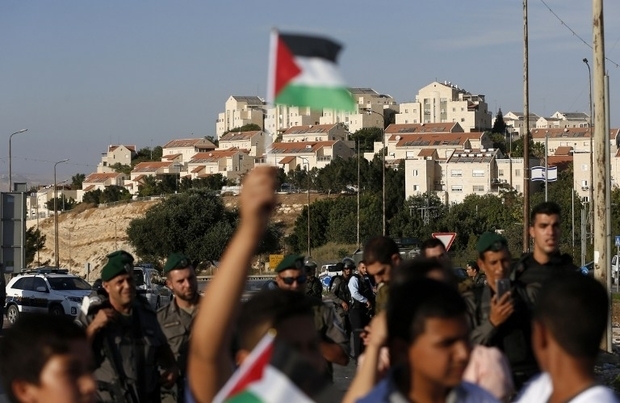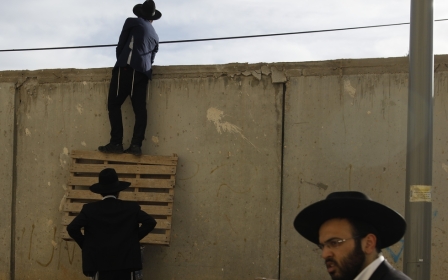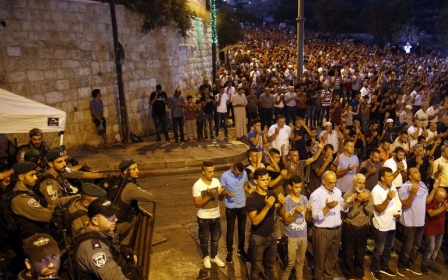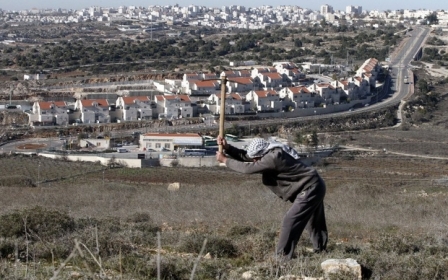Amnesty made the right call when it refused to host Israeli apologists

The commendable decision by Amnesty International UK to cancel an event this week organised by the Jewish Leadership Council (JLC) is an important development in the fight against Israel's illegal settlements in the occupied Palestinian territories.
The event, which was to focus on the ills of the United Nations Human Rights Council (UNHRC), featured Hillel Neuer, the head of pro-Israel pressure group UN Watch. Acknowledging that the booking should never have been approved in the first place, Amnesty UK pulled the plug on the event after concerns were raised both externally and within the organisation.
"We reserve the right to withhold permission for our building to be used by organisations whose work runs directly counter to our own," an Amnesty UK spokesperson said. "We are currently campaigning for all governments around the world to ban the import of goods produced in the Israeli-occupied Palestinian territories. We do not think it's appropriate for Amnesty to host an event by an organisation that actively supports Israel's settlements."
The right move
The decision to cancel the event was greeted with outrage by the JLC, Neuer and a host of Israel advocates – but here's why it was the right thing to do.
The JLC has claimed that it has "no publicly stated position on settlements" in the occupied Palestinian territories. Yet in December 2016, it backed a protest against the UN Security Council's adoption of a resolution condemning Israeli settlements.
JLC's then-chief executive Simon Johnson told the crowd that "the wording of the resolution represented an attempt by the UN to 'delegitimise' the Jewish state's claim to holy sites in Jerusalem, Hebron [in the occupied West Bank] and elsewhere".
The JLC also proudly takes an active role in fighting the Boycott, Divestment and Sanctions (BDS) campaign, including boycotts of settlement produce. When, for example, UK Methodists voted to boycott settlement goods, the JLC was furious, saying the church should "hang its head in shame".
Israeli settlements in the occupied Palestinian territories are a war crime, and are at the heart of a brutal, inherently discriminatory regime
Just last summer, current chair Jonathan Goldstein met with Gilad Erdan, the Israeli minister in charge of efforts to fight the non-violent, civil society-driven BDS campaign.
Moreover, as an umbrella group of more than 30 organisations, the JLC's members include Israel lobby group BICOM, which works to muddy the waters by, among other things, promoting the idea that the legality of settlements is a matter of "debate".
Another JLC member is the Zionist Federation, whose chair Paul Charney condemned Amnesty's call for Israeli settlement goods to be banned from entering the UK market. In doing so, he hailed "the 50th anniversary of the reunification of Jerusalem" – ie Israeli occupation and illegal annexation.
Occupation apologists
No one forces the JLC to include lobby groups and occupation apologists like BICOM and the Zionist Federation among its members, in whose name the JLC claims to speak. No one forced the JLC head to rail against a UN resolution that simply affirmed the illegality of Israeli settlements.
Similarly, the JLC itself chose to include Neuer in its event. This is a man who has described the Gaza Strip, with its two million Palestinians, as a "giant suicide bomb" - a man who has relentlessly smeared Amnesty itself as "pro Taliban-Hamas".
UN Watch, as an organisation, is also an apologist for Israeli settlements. In an article published last month, UN Watch claimed that settlement-based companies "promote peaceful co-existence by bringing Jews and Arabs closer together in a shared work environment". Interestingly, the piece was recently removed from its website, but is viewable via Google's cache.
It's hardly a surprise, then - given UN Watch and Neuer's track record of crass Israel advocacy - that, as an Amnesty spokesperson noted, "the presence of UN Watch raised significant concerns with partner organisations … and colleagues, both Israeli and Palestinian".
Severe rights abuses against Palestinians
Amnesty highlighted the aforementioned article as an example of a "patently pro-settlement" stance that directly conflicts with Amnesty's position that the settlements "are illegal and serve as the epicentre of severe and systematic human rights abuses against Palestinian civilians".
And that, of course, is the main point. As I wrote here earlier this month, Israeli settlements in the occupied Palestinian territories are a war crime, and are at the heart of a brutal, inherently discriminatory regime.
Yet both the JLC and UN Watch work hard to ensure that Israel enjoys impunity for such crimes. Why on earth should Amnesty be expected to host an event by, and featuring, groups and individuals fundamentally opposed to the global NGO's accountability focused agenda?
Predictably, and shamelessly, the JLC has claimed that Amnesty UK's decision constitutes "a boycott of the Jewish community". Such transparently disingenuous accusations of anti-Semitism were ably shot down by Amnesty UK on Twitter, with the NGO noting: "This is not an issue of faith. Such smears have been levelled at orgs opposed to Israel's inherently discriminatory & illegal settlements for years. It is our duty to shine the spotlight on perpetrators of rights abuses – irrespective of what faith they may or may not have."
The JLC and UN Watch do not have a leg to stand on, and neither do those jumping on the "outrage" bandwagon. Amnesty UK should be applauded for reviewing a decision made in error and sticking to the fundamentals of international law, human rights and accountability.
Those who denigrate rights campaigners and apologise for war crimes are free to do so – but they shouldn't expect to be hosted by a human rights group.
- Ben White is the author of Israeli Apartheid: A Beginner's Guide and Palestinians in Israel: Segregation, Discrimination and Democracy. He is a writer for Middle East Monitor and his articles have been published by Al Jazeera, al-Araby, Huffington Post, the Electronic Intifada, the Guardian's Comment is Free and more.
The views expressed in this article belong to the author and do not necessarily reflect the editorial policy of Middle East Eye.
Photo: Palestinian activist Issa Amro (L), from the Youth Against Settlements organisation, and an Israeli settler argue on 18 September 2017 during a demonstration against a recent decision by Israel to boost the powers of the settlers in Hebron, in the Israeli occupied West Bank (AFP)
New MEE newsletter: Jerusalem Dispatch
Sign up to get the latest insights and analysis on Israel-Palestine, alongside Turkey Unpacked and other MEE newsletters
Middle East Eye delivers independent and unrivalled coverage and analysis of the Middle East, North Africa and beyond. To learn more about republishing this content and the associated fees, please fill out this form. More about MEE can be found here.






